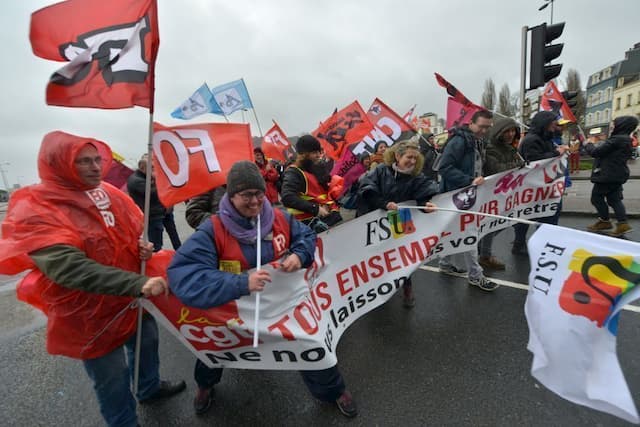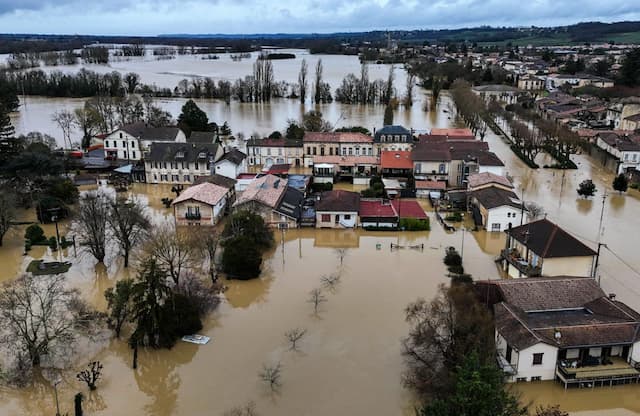Pensions: New Events, the Movement Looking for a Second Wind

For the sixth time since December 5th, the unions call for “a day of massive inter-professional mobilization of strikes and demonstrations”.
After six weeks of conflict, unions opposed to the pension reform call on Thursday 16 January 2020 for a new day of demonstrations. It will be a test for the rest of the movement which is trying to expand beyond transport where the strike is running out of steam, pending a new meeting in the street on January 24th.
For the sixth time since December 5th, the unions (CGT, FO, Solidaires, FSU, CFE-CGC and three youth organizations) calls for “a day of massive inter-professional mobilization of strikes and demonstrations”. Processions will parade throughout France, culminating in the afternoon between Montparnasse and Place d’Italie in Paris.
Communiqué de l’intersyndicale du 15 janvier
Source : https://t.co/Sgtqp0Pgvi pic.twitter.com/OQL7NHmZrW— La CGT (@lacgtcommunique) January 15, 2020
Register the movement over time
The challenge for these unions is to find a significant mobilization after a day of local action Tuesday little followed and national days in decline: the 11th, the police had counted 149,000 demonstrators after 452,000 Thursday 9th January, against 805,000 during from the first day of December 5th.
In this context, the unions posted on Wednesday evening its determination to register the movement a little longer, announcing new mobilizations on 22, 23 and especially 24th January, the day of the examination of the pension law in the Council of Ministers, with a national day of action which will therefore be the 7th.
In the meantime, public transport, the spearhead of a mobilization that would have cost the SNCF and RATP more than a billion euros, according to Matignon, is gradually coming into line.
Clear improvement in transport
About one in five drivers was on strike Wednesday at the SNCF, which on Thursday foresees “almost normal” traffic for TGV, 8 TER out of 10 and three Transilien out of four. At RATP, the situation is improving more slowly, with all the lines open but still very discontinuously.
Amélioration du trafic @SNCF confirmée ce jeudi 16 janvier pour les trains du quotidien (TER, Transilien). Retour progressif à la normale pour les trains à grande vitesse.
Communiqué de Presse :
🔗 https://t.co/nCpfZQISJq pic.twitter.com/01DS1LPe7n— Groupe SNCF (@GroupeSNCF) January 15, 2020
The processions should once again count many teachers despite the opening on Monday of negotiations which should lead to a law for the programming of salary increases.
To relaunch the movement, the CGT launched the dockers into battle with a “dead ports” operation in the seven major French seaports, which should continue next week.
Falling
Security officers from the Banque de France and operators responsible for sorting banknotes are also on strike. But “we lack an important player: the garbage collectors. If the garbage collectors were on strike and if the gas stations were dry it would be a game-changer, ”admitted a union member a few days ago.
For their part, lawyers, who multiply symbolic actions, obtained Wednesday from the government the maintenance of “a fund specific to their profession”, but this arrangement does not satisfy the National Council of Bars.
If the mobilization falls, it remains in any case supported mainly by public opinion, according to polls which do not show the impact of the compromise reached between Edouard Philippe and the “reformist” unions (CFDT, Unsa and CFTC).
The executive responded to the request of these unions by agreeing to abolish the gradual introduction from 2022 of a pivotal age with a bonus-penalty. A “financing conference” will be responsible by the end of April for finding the means to guarantee financial balance in 2027.
Risk of radicalization
This compromise is a “decoy” for the anti-reform unions, which are somewhat irritated at being ignored by the government and are risking the risk of a “radicalization” of their base.
“Contrary to what you claim, the government’s strategy, its concept of dialogue and listening are not likely to appease the level of dissatisfaction,” CGT number one Philippe Martinez wrote this week to the Prime Minister. .
Relations also get tense between unions. Due to the representativeness rules adopted by the government, Solidaires and FSU denounce the fact that they will not be able to participate in the financing conference unlike Unsa, which is favourable to the reform. For his part, Laurent Escure (Unsa) accused “the CGT and FO of having brought a certain number of employees into the wall” by leading them “towards a claim which is almost certain not to find an outlet”.
Enjoyed this? Get the week’s top France stories
One email every Sunday. Unsubscribe anytime.


